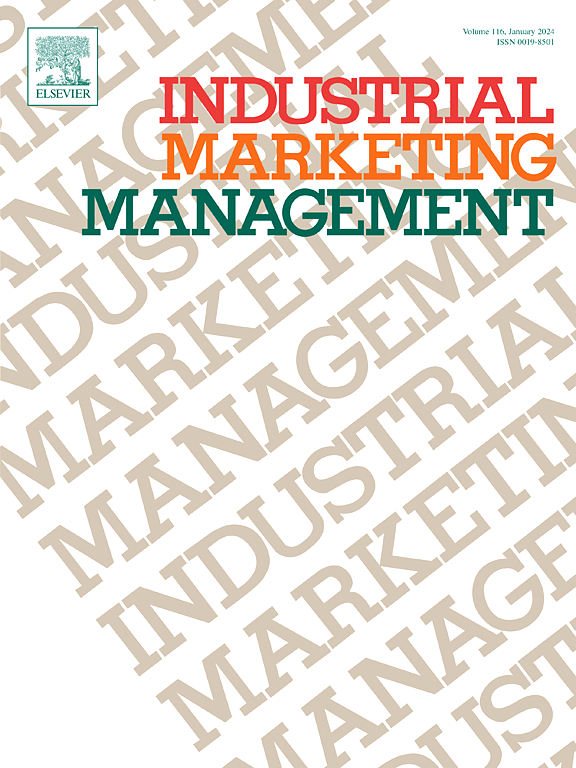SMEs' use of AI for new product development: Adoption rates by application and readiness-to-adopt
IF 7.5
1区 管理学
Q1 BUSINESS
引用次数: 0
Abstract
Artificial Intelligence (AI) is poised to transform all aspects of business, and with it, new product development (NPD). Pioneering companies that are early adopters of AI for NPD have reaped substantial rewards, seeing notable reductions in development timelines and a heightened pace of innovation. These are larger firms like Siemens, GE, Nestle, and Pfizer; but what about the more typical or smaller firm? To address this question, we surveyed Irish small-to-medium-sized enterprises (SMEs), organized by the Innovation and Research Development Group (IRDG) in Ireland.
This article unveils the study's findings, shedding light on the current implementation status of AI across 13 crucial applications in NPD. It also delves into the SMEs' intentions to adopt AI in their NP processes in the foreseeable future, along with the improvements that AI has already brought. Importantly, the study also focuses on SMEs' readiness to adopt AI for NPD, the most important metrics gauging readiness, and possible causes of hesitancy to adopt AI.
SMEs in the study have not implemented AI across any of the 13 possible application areas in NPD to a great extent, and the intent-to-adopt is also not strong. Performance results from deploying AI in NPD to date are modest, averaging about 27 % improvement on each of the five KPIs. Further, SMEs' readiness-to-adopt AI for NPD reveals that they are not strongly committed to moving ahead with AI in NPD for a variety of reasons, including the high costs of acquiring AI; challenges in building a strong business case; cybersecurity and IP risks; and recent AI failures.
The urgency to act and embrace AI in NPD becomes evident as we uncover the immense potential it holds for propelling businesses into a future of enhanced productivity, efficiency, and innovation.

中小企业在新产品开发中使用人工智能的情况:应用的采用率和采用的准备程度
人工智能(AI)将改变商业的各个方面,并随之改变新产品开发(NPD)。早期采用人工智能进行新产品开发的先锋公司已经获得了可观的回报,开发时间显著缩短,创新步伐加快。这些公司包括西门子、通用电气、雀巢和辉瑞等大公司;但是更典型或更小的公司呢?为了解决这个问题,我们调查了由爱尔兰创新与研究发展集团(IRDG)组织的爱尔兰中小企业(SMEs)。本文揭示了该研究的结果,揭示了人工智能在NPD中13个关键应用的当前实施状况。它还深入研究了中小企业在可预见的未来在其NP流程中采用人工智能的意图,以及人工智能已经带来的改进。重要的是,该研究还关注了中小企业对采用人工智能进行新产品开发的准备程度,这是衡量准备程度的最重要指标,以及对采用人工智能犹豫不决的可能原因。研究中的中小企业在很大程度上没有在NPD的13个可能的应用领域中实施人工智能,采用的意愿也不强。迄今为止,在新产品开发中部署人工智能的性能结果并不理想,在五个kpi中,每个kpi平均提高了27% %。此外,中小企业在新产品开发中采用人工智能的意愿表明,由于各种原因,他们并没有坚定地致力于在新产品开发中推进人工智能,包括获取人工智能的高成本;建立一个强有力的商业案例所面临的挑战;网络安全和知识产权风险;以及最近的人工智能失败。随着我们发现人工智能在推动企业进入提高生产力、效率和创新的未来方面的巨大潜力,在新产品开发中采取行动和拥抱人工智能的紧迫性变得越来越明显。
本文章由计算机程序翻译,如有差异,请以英文原文为准。
求助全文
约1分钟内获得全文
求助全文
来源期刊

Industrial Marketing Management
Multiple-
CiteScore
17.30
自引率
20.40%
发文量
255
期刊介绍:
Industrial Marketing Management delivers theoretical, empirical, and case-based research tailored to the requirements of marketing scholars and practitioners engaged in industrial and business-to-business markets. With an editorial review board comprising prominent international scholars and practitioners, the journal ensures a harmonious blend of theory and practical applications in all articles. Scholars from North America, Europe, Australia/New Zealand, Asia, and various global regions contribute the latest findings to enhance the effectiveness and efficiency of industrial markets. This holistic approach keeps readers informed with the most timely data and contemporary insights essential for informed marketing decisions and strategies in global industrial and business-to-business markets.
 求助内容:
求助内容: 应助结果提醒方式:
应助结果提醒方式:


